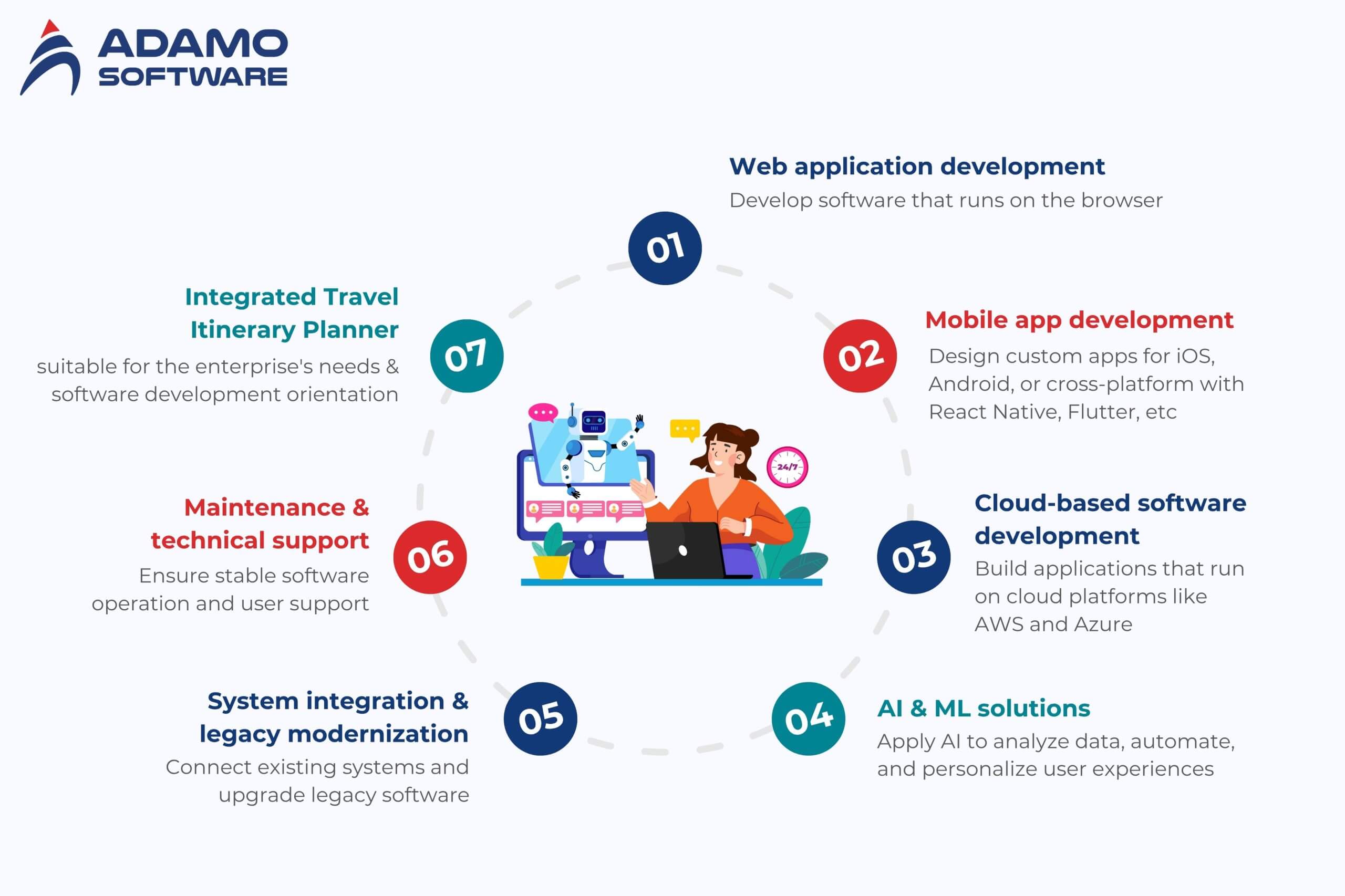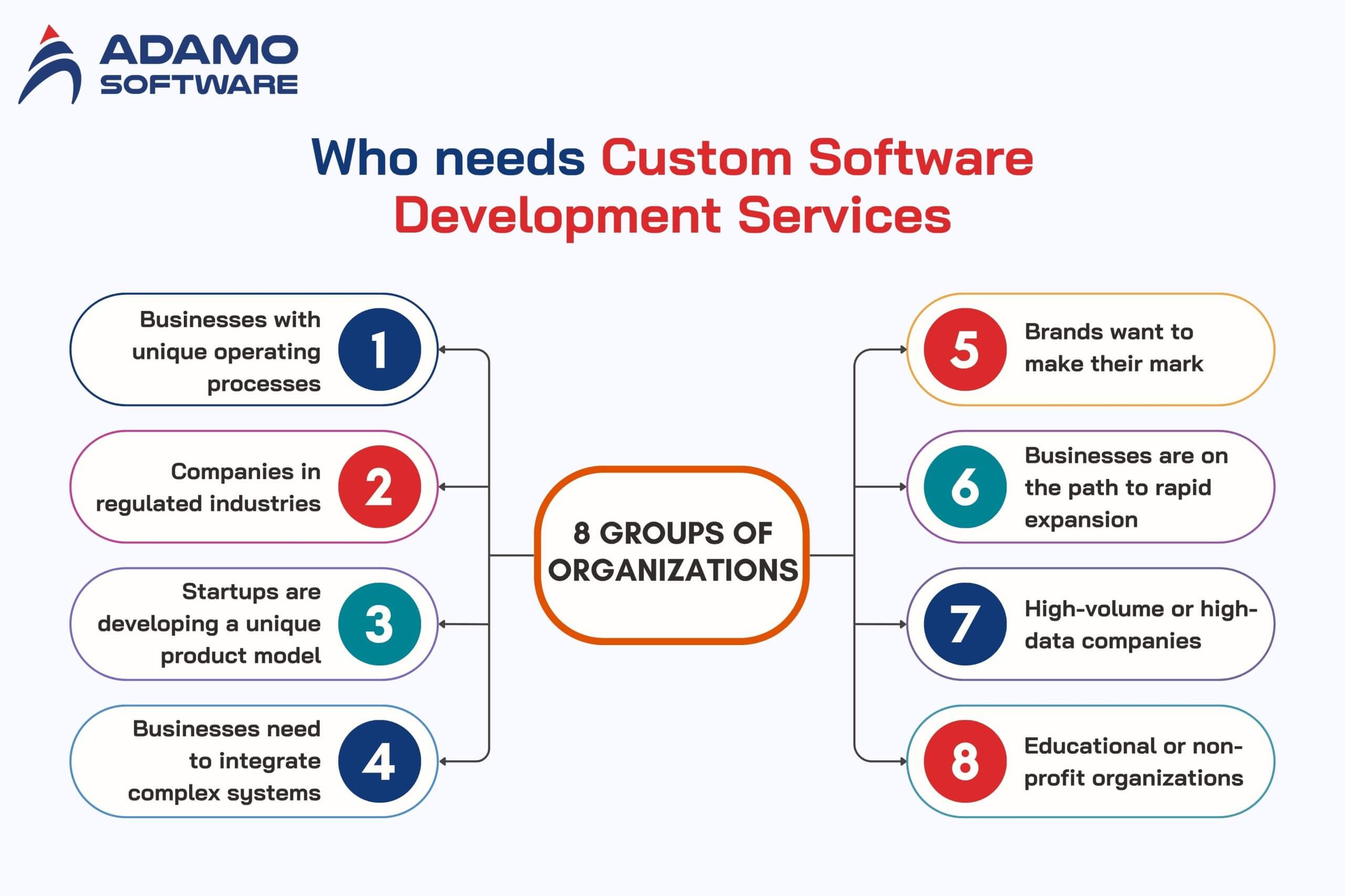Custom Software Development Services: Who needs it and Why

Discover top custom software development services: Definition, 6 key types, who needs them, and must-know tips before building your software.
In the digital age, software supports operations and is the core platform that helps businesses increase efficiency and improve customer experience. However, while standard tools such as email or office applications are still helpful, they are often insufficient to meet the requirements when businesses start to scale. At this point, off-the-shelf software solutions gradually reveal their limitations – lack of flexibility, difficulty expanding, and not accurately reflecting internal operating processes.
That is why custom software is increasingly popular. With the ability to be specifically designed according to business needs, custom software is more suitable in terms of functionality and easier to integrate, expand, and maintain a long-term competitive advantage.
The growth of this market reflects this trend. According to Custom Market Insights’ 2024 report, the global custom software development market value reached around USD 42.7 billion in 2024. It is forecasted to exceed USD 114 billion by 2029, with a CAGR of 22.4%. This shows the growing role of custom software in business operations and development strategies.
In this article, we will explore:
- What is a custom software development service?
- 6 most popular types of custom software development services
- Who should apply for “tailor-made” software development services
- Factors to consider when developing custom software
I. Definition of Custom Software Development Services
Custom software development services are the process of building software that is “tailor-made” to the unique needs of each business. Unlike off-the-shelf solutions, custom software is designed to fit your specific business operations and goals.
This is especially useful for businesses that have complex processes or require integration with existing systems.
In addition to programming, services include interface design, testing, deployment, maintenance, and technical support.
Choosing custom software development is more than just ordering a tool — it’s investing in a long-term, flexible solution that can adapt as your business grows. It’s also a way to gain a competitive advantage and increase your innovation ability.
II. 6 main types of Custom Software Development Services
Not every business needs the same software — every industry and every process are unique. That’s why custom software development services often offer various services to meet each client’s specific needs.
Here are the 7 most popular types of custom software development services today:

- Web application development: Develop software that runs on the browser and is optimized for performance, security, and scalability.
- Mobile app development: Design custom apps for iOS, Android, or cross-platform with React Native, Flutter, etc.
- Cloud-based software development: Build applications that run on cloud platforms like AWS and Azure, providing flexibility and saving on infrastructure costs.
- AI & Machine Learning solutions: Apply artificial intelligence to analyze data, automate, and personalize user experiences.
- System integration & legacy modernization: Connect existing systems and upgrade legacy software to accommodate new technologies.
- Maintenance & technical support: Ensure stable software operation, periodic maintenance, error correction, and user support.
- IT consulting: Technology consulting suitable for the enterprise’s needs and software development orientation.
1. Web Application Development
Custom software development services are the process of building software that is “tailor-made” to the unique needs of each business. Unlike ready-made tools, custom software is tailored to match your business’s exact needs and strategic direction.
This is especially useful for businesses that have complex processes or require integration with existing systems. In addition to programming, services include interface design, testing, deployment, maintenance, and technical support.
2. Mobile Application Development
In the era of mobile dominance, mobile application development is not just a trend but a strategic step to help businesses expand customer access channels and optimize operations.
Depending on the budget and business goals, companies providing custom software development services will advise on suitable solutions:
- Native app: Applications are written specifically for iOS (Swift) or Android (Kotlin/Java), optimizing performance and the best user experience.
- Cross-platform app: Build once, deploy everywhere. Frameworks like React Native or Flutter let you launch on iOS and Android with a shared codebase.
- Hybrid app: Merge web and native elements using tools like Ionic or Cordova — ideal for faster development and tighter budgets.
Not just stopping at basic features, modern applications can also integrate offline-first mode, end-to-end security, and automatic updates – bringing a seamless experience to users.
3. Cloud Software Development
Cloud computing has completely changed how businesses create and manage their software systems. Instead of investing in bulky infrastructure, companies can now develop applications based on cloud platforms such as AWS, Azure, or Google Cloud – more flexible, easier to scale, and significantly cost-effective.
The outstanding benefits of cloud software include:
- Access anytime, anywhere
- Automatic data backup and recovery
- Easy integration with APIs and external services
- Flexible resource scaling according to demand
Cloud is the strategic solution for businesses that need to adapt quickly in a volatile environment.
4. AI & Machine Learning Solutions
Artificial intelligence (AI) and machine learning (ML) are no longer distant concepts – they have become essential tools to help businesses exploit data, automate, and improve customer experience.
Custom software development often incorporates AI features such as:
- Analyzing user behavior from big data
- Automating processes through RPA
- Recommending products based on personal preferences
- Intelligent interactions through chatbots or voicebots
Applying AI saves resources and brings a distinct competitive advantage – something that later businesses will find difficult to catch up with.
Explore Our Tailor-made Software Development Solutions
We are confident in providing end-to-end software development services from fully-functioned prototype to design, MVP development and deployment.
5. System Integration & Legacy Modernization
Many businesses still operate on old, cumbersome systems, which can become a barrier when integrating new technology or expanding scale.
System integration and legacy software modernization services act as a “bridge solution”, helping businesses:
- Rewrite or improve legacy systems to increase performance.
- Connect internal software with CRM, ERP, payment gateway platforms, etc.
- Migrate data to a new platform without affecting operations.
This process requires high technical skills, understanding of legacy systems, and experience in risk management – something that only professional custom software development services providers can ensure.
6. Maintenance & Support
Completing software development is just the starting point. Maintenance, updates, and technical support play a vital role in maintaining the stability and security of the system.
Maintenance services typically include:
- Performance monitoring & early detection of errors
- Regular patching, security enhancements
- End-user support
- Training internal teams to take over the system
Custom software development services often provide clear SLAs (Service Level Agreements) – committing to fast response times and timely troubleshooting.
7. IT Consulting
Not every business has a technical team to determine what to build and what technology to use. Therefore, IT consulting services are a necessary steppingstone – essential for expanding startups or businesses.
- Identify your needs & choose the right technology.
- Propose a flexible, scalable software architecture.
- Create a clear, phased development roadmap.
Starting right will save your business money, avoid misdirected investments, and increase your chances of long-term success.
Also read:
Tech stacks for Offshore Software Development: What works best in 2025?
Software development strateges: Models and Methodology
III. Who needs to embrace Custom Software Development Services
Not every business needs off-the-shelf software. More companies – from startups to large corporations – are realizing that custom software development services help them operate more efficiently, gain more control, and create a differentiated customer experience. Here are a few groups of organizations that should seriously consider investing in this solution:

- Businesses with unique operating processes: When internal processes don’t “fit” into mass-market software, building your system helps ensure that every step of your business’s operations is precisely how you want it to be.
- Companies in regulated industries, such as healthcare, finance, insurance, etc., are industries with strict security and compliance requirements. Custom software helps you keep tight control of your data and keep it up to date with the latest standards.
- Startups are developing a unique product model: When your product or service is something no one has done before, it’s hard to find the right software. Customization is the only way to test, iterate, and grow quickly.
- Businesses need to integrate complex systems: Using multiple disparate systems to manage each part of your work, custom software will help everything connect more smoothly, reduce errors, and save time.
- Brands want to make their mark: A distinct interface, a seamless customer experience, or a “one-of-a-kind” order processing process – these are all things that generic software can’t give you.
- Businesses are on the path to rapid expansion: As the number of users, data, and operations skyrockets, you need a system that is flexible enough to scale in the way you want, not in a fixed format.
- High-volume or high-data companies: Organizations that handle thousands of daily transactions need a stable, secure platform to handle real-time processing without interruption.
- Educational or non-profit organizations: Every organization operates differently – from student management to grantmaking. A customized solution is not only more appropriate but also more cost-effective by eliminating unnecessary features.
IV. Things to consider when developing Custom Software
1. Clearly define the business goal
Before writing the first line of code, businesses must answer the question: What problem is this software created to solve? Increase revenue, reduce manual processes, or improve customer experience? A well-defined goal leads to a more achievable and tailored tech outcome. Don’t rush to think about technology without an accompanying operational strategy. Defining goals from the beginning will also help shape the system architecture, choose the right tech stack, and build realistic performance indicators (KPIs).
2. Identify the factors that create long-term value
Good software doesn’t just work stably – it must create clear value for the business. That can come from increasing order processing speed, improving customer experience, or expanding the business model. Evaluate software not only by features, but also by its ability to bring ROI in the next 6 months, 1 year, or 3 years. Long-term value is the true success measure of a custom software development services investment—not just “meeting deadlines” or “error-free code.”
3. Choose the right development team
Investing in a highly skilled team saves on future fixes – from logic errors to security. Outsourcing will be optimal for non-tech businesses in terms of time, quality, and team scalability. However, don’t underestimate vendor management: you still need an internal leader to guide, maintain quality, and communicate product expectations. An experienced partner in custom software development services can accelerate progress and reduce rework.
4. Commit to participating throughout the development process
Custom software development services are not a “buy and sell” product. Businesses need to take a proactive role – from approving the first design to checking the results of the weekly sprint. Inconsistent communication, slow feedback, or absenteeism in review sessions can delay progress and increase costs. A good development process always includes a clear schedule, regular meetings, and two-way commitment between the technical team and the customer.
5. Focus on prototyping and UI/UX design right from the start.
Prototype is a tool that helps businesses visualize the user experience – before the system is completed. Testing the operation flow, screen layout, and navigation logic early will minimize the risk of “smashing and rebuilding” when entering the coding stage. In today’s application world, UI/UX is not just an aesthetic factor – it is a competitive factor determining whether users will continue to come back.
6. System Integration Compatibility
Custom software cannot stand alone. It must connect well with existing CRM, ERP, POS, or third-party platforms. Especially if you are using a legacy system, integration will require more resources than expected.
- Identify APIs, shared data, and essential connection points.
- Carefully check data compatibility and standardization.
Seamless integration is a critical factor in the success of custom software development services projects.
7. Proactively identify and control risks
Software is a living product, and there are always potential risks: changing requirements, lack of resources, security errors, etc. A professional partner always builds a risk management plan, listing possible situations and corresponding handling plans. The sooner you identify risks, the more likely you are to respond promptly and limit losses when problems arise.
8. Communicate clearly and systematically
Whether it is an internal or outsourced team, incomplete communication of requirements is the leading cause of product failure. Ensure all features, expectations, and changes are documented, regularly updated, and agreed upon between stakeholders. Effective communication reduces errors and helps maintain the planned deployment speed.
9. Comprehensive testing before going live
No product should go live without rigorous testing at both the technical (internal QA) and user experience (UAT) levels. This is a crucial step to determine whether the system solves the problem and is as easy to use as expected. Don’t wait until the entire deployment to “fix” the problem.
10. Limit decision-making points
A common mistake that slows a project is involving too many people in decision-making. Each department has its perspective, but without a primary “keeper,” the product will easily be pulled in many directions, losing its original shape. Assign one main point of contact — typically a Product Owner — to streamline communication and decision-making
V. Conclusion

As digital transformation reshapes industries, custom software is no longer a luxury. It’s a business necessity. With modular, scalable solutions, companies can stand out and grow faster. Only tailored systems deliver the control, flexibility, and long‑term value you need.
At Adamo Software, we’ve delivered over 200 custom projects to 150+ clients globally, with a 90% client satisfaction rate
We offer full‑cycle custom software development services from discovery to deployment. Our scalable, secure solutions are tailored to your growth plans.
Ready to elevate your business with tailored digital tools? Contact Adamo Software today to start your custom software journey.





